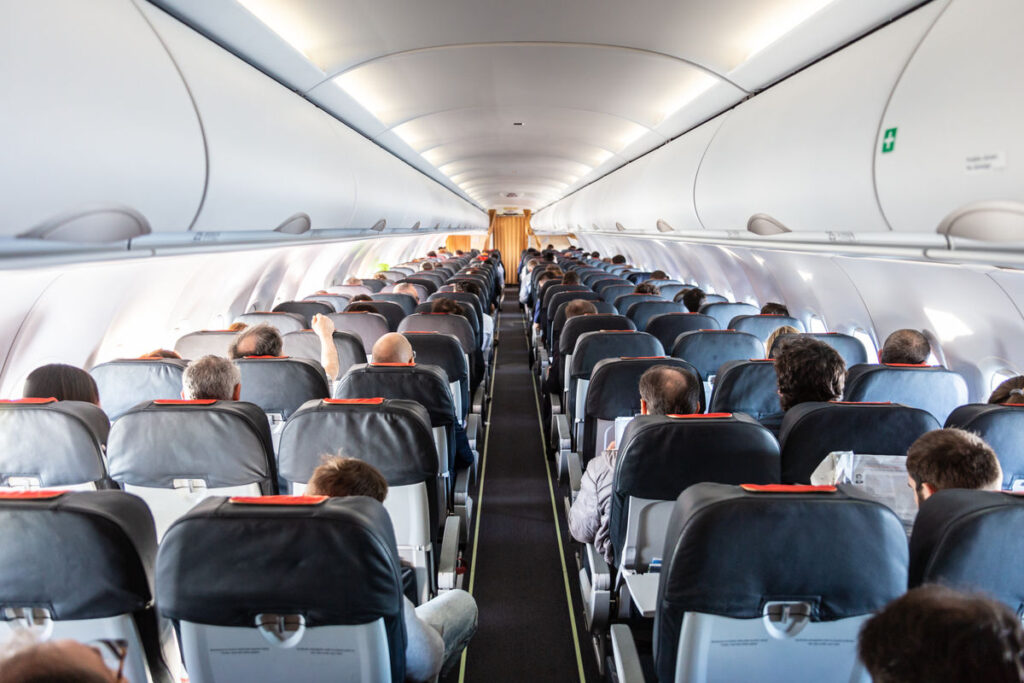
A particular type of airline safety incident has been happening more frequently, affecting the health of flight attendants, pilots, and passengers, according to a new report.
Toxic fumes are leaking into airline cabins at a rapidly growing rate, says a report from The Wall Street Journal. These types of onboard fume incidents typically happen when aviation oil accidentally leaks into a part of the aircraft engine that pulls clean air into the cabin.
Depending on the severity of the oil leak, the fume episodes can range from a barely noticeable bad odor inside the plane to smoke that fills the cabin and sickens those onboard. The more severe incidents, or repeated exposures, can have dire effects on crew and passenger wellbeing. Potential symptoms and illnesses resulting from a toxic fume incident include difficulty breathing, hyperventilation, headache, vomiting, confusion, vertigo, memory loss and more, according to the Journal.
The incidents can lead to emergency landings, as well as crew and passenger hospitalization, with some experts postulating that more severe incidents can cause serious conditions like traumatic brain injury, nervous system damage, and potentially cancer. That’s because compounds in aviation oils are known carcinogens and neurotoxins, such as formaldehyde and others.
The incidents, called “bleed air” incidents in industry parlance, have occurred for decades but are now happening ever-more often. The Wall Street Journal examined fume event reports that airlines submitted to the FAA. In 2014, there were “about 12 fume events per million departures,” the Journal reported. “By 2024, the rate had jumped to nearly 108.”
The FAA told the Journal that the increase was due in part to a change in reporting protocols for fume events. However, the report notes that the shift was implemented fairly recently in November 2024.
The Journal’s report shows that the fume events happen most often on Airbus A320 planes, due to specificities of the engine design. The A320 is the best-selling plane in the world and is favored by airlines for the efficiency of its engines. “We are committed to continuously enhancing our products, working closely with operators and regulators to ensure the best possible cabin environment for passengers and crew,” Airbus said in a statement to the Journal.
The only commercial aircraft that doesn’t pull in cabin air through the engines—and therefore isn’t at risk for such episodes—is the Boeing 787 Dreamliner jet.
“Toxic fumes in aircraft cabins highlight aviation’s hidden and ongoing challenge: passenger and crew well-being,” said Jungho Suh, a teaching assistant professor of management at the George Washington University School of Business. “While airlines face pressure to modernize fleets and implement AI-driven systems, health and safety must stay a top priority. Long-term trust in air travel relies not just on efficiency but on creating cleaner, safer environments where technology and humanity progress hand in hand.”
The issue has been a hot-button one for flight attendants’ unions for years, especially over the past decade or so. In 2017, the Association of Flight Attendants-CWA, one of the nation’s largest unions that represents about 50,000 flight attendants at 20 airlines, advocated for legislation that would require the FAA to assess the feasibility of prevention tactics like crew training for fume events and installing fume sensors on commercial aircraft. That legislation passed with the 2018 FAA reauthorization bill, but the progress of those measures aren’t clear.
However, a new bill on the matter was introduced to Congress in 2024 and is now building momentum on the Hill. The bi-partisan Safe Air on Airplanes Act seeks to phase out bleed air systems aboard aircraft and was introduced by Congressman Maxwell Frost (D-FL) after he heard from a constituent who suffered a bleed air incident as a flight attendant. The bill gained additional support in August 2025 when it was endorsed and reintroduced by Congressman John Garamendi (D-CA), a senior member of the House Committee on Transportation and Infrastructure.
In addition to eventually phasing out bleed air systems on existing aircraft, the bill would require filters on all current bleed air systems within seven years to keep oil particulates from entering the aircraft interior and ban the systems on newly built aircraft.
“Everyone who boards a plane should be able to trust that the air is clean and safe,” said Sara Nelson, international president of the Association of Flight Attendants, when the bill was reintroduced. “We have known for decades that current bleed air systems can dump toxic chemicals and fuels into the aircraft cabin, poisoning the air for everyone on board. Instead of making simple changes to protect us, manufacturers and airlines have prioritized corporate profits. Flight Attendants applaud Rep. Frost for his leadership on the bipartisan Safe Air on Planes Act. We will work with him to pass this critical legislation that protects our health and the health of the passengers in our care.”
For the latest travel news, updates and deals, subscribe to the daily TravelPulse newsletter.

